 Petzlover
Petzlover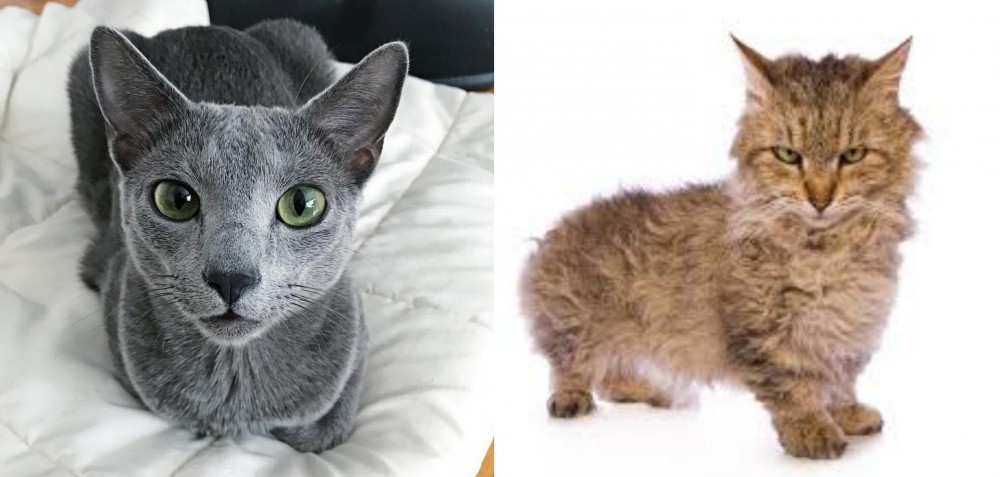 Blue Russian is originated from Russia but Skookum is originated from United States. Both Blue Russian and Skookum are having almost same weight. Blue Russian may live 5 years more than Skookum. Both Blue Russian and Skookum has almost same litter size. Both Blue Russian and Skookum requires Low Maintenance.
Blue Russian is originated from Russia but Skookum is originated from United States. Both Blue Russian and Skookum are having almost same weight. Blue Russian may live 5 years more than Skookum. Both Blue Russian and Skookum has almost same litter size. Both Blue Russian and Skookum requires Low Maintenance.
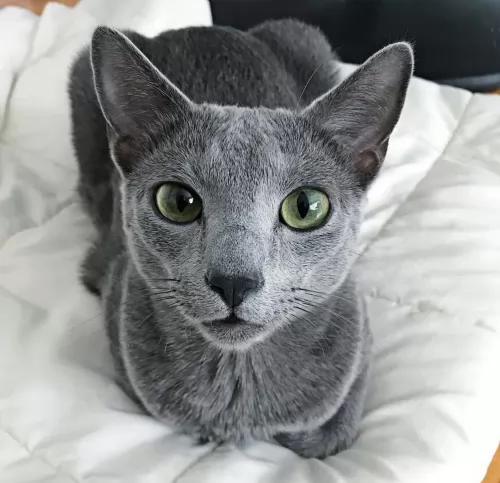 The Blue Russian is a rare cat and not much is known about its origins, but it is believed that the cat comes from northern Russia.
The Blue Russian is a rare cat and not much is known about its origins, but it is believed that the cat comes from northern Russia.
The Cat Fanciers Association believes that the cat descended from cats kept by Russian Czars. Research tells us that there is no mention of the Blue Russian until the 19th century. The Russia Blue made its first public appearance in 1875, being exhibited at London’s Crystal Palace as the ‘Archangel Cat’.
By 1912, the Russia Bue was given its own classification after its introduction to the USA in the early 1900s.
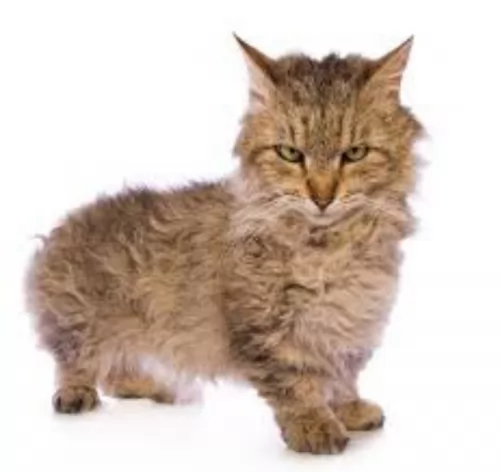 Skookums are a new cat breed – an experimental and rare hybrid dwarf cat breed, It was developed in the United States in the 1990s.
Skookums are a new cat breed – an experimental and rare hybrid dwarf cat breed, It was developed in the United States in the 1990s.
As a new breed, you’re not going to find too much information on their history, but is was breeder Roy Galusha who started crossing the Munchkin cat with the LaPerm.
Even today, some years later, the Skookum cat is still an experimental cat breed that is considered a rare dwarf breed. It is recognized as an Experimental breed by Independent European Registries as well as the Dwarf Cat Association.
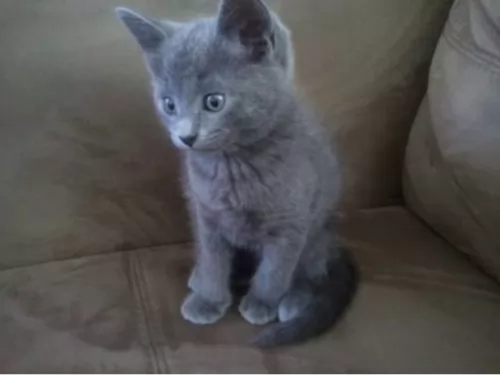 The Russian Blue is a medium-sized cat with a long, finely-boned boy. It is a slender cat, but he appears larger because of his dense double coat.
The Russian Blue is a medium-sized cat with a long, finely-boned boy. It is a slender cat, but he appears larger because of his dense double coat.
He weighs in the region of 3 – 6kg. In spite of the dense and luxurious short silvery coat, the cat doesn’t shed much. The coat can in fact be a silvery shade to a dark slate grey. The eyes are a beautiful green, the ears widely spaced and slightly rounded at the top.
The Russian Blue is a sweet-tempered cat who becomes attached to his human owner and who will even follow his owner much like a dog.
This particular cat breed may be quite shy, but he becomes social around his family members and may even be reluctant to share time with strangers.
He also doesn’t mind spending some time alone if you have to work. Curious and intelligent the Russian Blue is somewhat reserved but he makes a great companion as he is sensitive to his owner's moods.
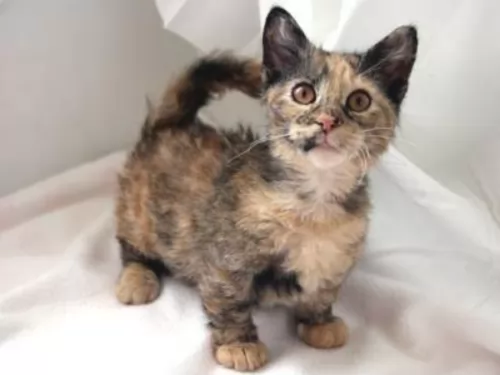 The dwarf Skookum only weighs between 2 and 3kg. It is a new cat breed with a curly coat. The coat can be in a range of colors and patterns.
The dwarf Skookum only weighs between 2 and 3kg. It is a new cat breed with a curly coat. The coat can be in a range of colors and patterns.
It is a small, lightweight cat with short legs and a broad head and stocky build. It has a muscular build. The eyes are large and walnut- shaped while the ears are large and pointed.
The neck is also thickish. The coat is soft and curly, standing away from the body and spiraling into ringlets. It can feature a number of colors and patterns such as solid, bicolor, and colorpoint. These cats can be long-haired or short-haired.
They are playful cats, full of energy and they love climbing and jumping. They’re intelligent, confident cats and are also loyal and loving towards their human family. They may be active, playful cats, but they still like to settle down into your lap.
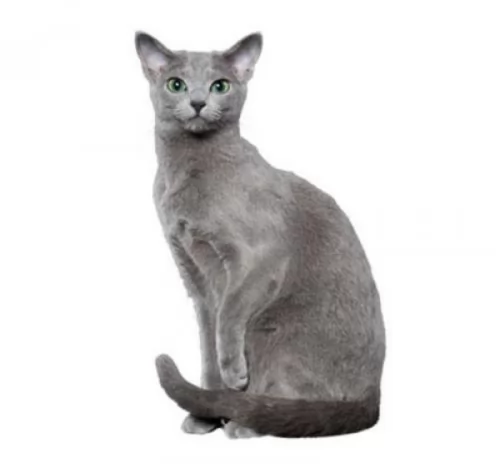 Russian blue cats are such intelligent creatures and he will require some mental stimulation because of it.
Russian blue cats are such intelligent creatures and he will require some mental stimulation because of it.
He loves mealtimes, but remember to not overfeed him as this shortens his lifespan.
He is a vocal cat and will tell you when he is hungry or he wants to play.
These cats don’t like too many changes so keep things the same for him.
When you try to keep your lovely Blue Russian happy, you’ll be rewarded by having a fantastic feline companion.
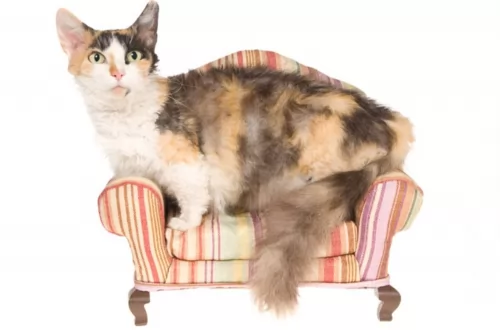 Because the Skookum cat is still in its early stages of development if you want to know precisely what the characteristics of the cat are you would want to look at the Munchkin and the LaPerm cat.
Because the Skookum cat is still in its early stages of development if you want to know precisely what the characteristics of the cat are you would want to look at the Munchkin and the LaPerm cat.
One thing is sure the Skookum cat thrives on the attention of his human family and if you provide him with the love and attention he craves, you can be sure that he will turn out to be the right friend and companion for your family.
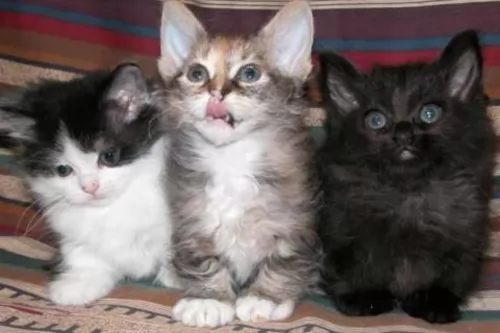 Because the Skookum cat is a new, experimental breed, health problems with the cat are not well known. However, every cat can succumb to some of the common cat health issues there are. As a pet owner you want to watch for and recognize signs that your cat’s health is in trouble.
Because the Skookum cat is a new, experimental breed, health problems with the cat are not well known. However, every cat can succumb to some of the common cat health issues there are. As a pet owner you want to watch for and recognize signs that your cat’s health is in trouble.
Feline leukemia for instance is a disease that spreads through bodily fluids such as urine, saliva and nose discharge, and saliva. Mother cats can even pass the disease along to her kittens. Feline leukemia can also lead to a host of conditions such as diarrhea, respiratory tract infections, skin problems and eye diseases among others.
Feline panleukopenia is known to most people as feline distemper and it is a very contagious viral disease with kittens being most at risk.
The disease affects a cat's immune system and the cat will likely have diarrhea, vomiting and dehydration, and lethargy. It’s a deadly disease that requires a vaccine to prevent it.
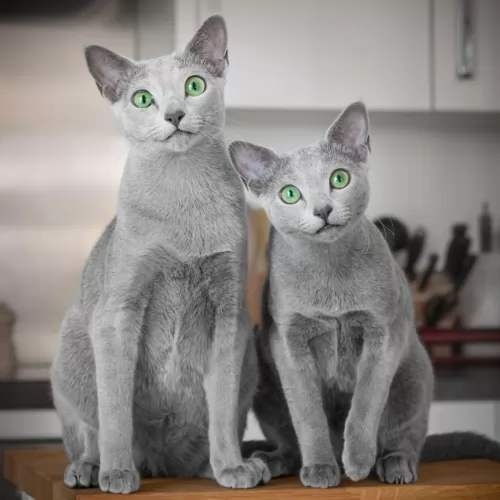 Part of caring for a cat as a responsible pet owner comes from feeding your pet. The Russian Blue is a cat that enjoys his food so you will have to look out for overfeeding.
Part of caring for a cat as a responsible pet owner comes from feeding your pet. The Russian Blue is a cat that enjoys his food so you will have to look out for overfeeding.
A cat that is overweight can start developing joint problems and diabetes. Rather stick to scheduled meals so that you can know exactly what your feline pet is getting. Such a beautiful cat needs the best food there is to keep the coat shiny and healthy and to prevent illness.
Always read the food labels to ensure the best ingredients and the right portion sizes. Make sure your cat gets food that is meat protein-rich as a cat is a carnivore.
Water is another important part of your Blue Russian’s diet. Fresh cool water should be available for your cat night and day. Water bowls are good but a water fountain is a tantalizingly attractive way for your pet to be attracted to drinking more water.
Make sure that you rake up all your cat’s droppings from the litter box every day as the Russian Blue is a hygienic cat and wants a clean litter box. Make sure the litter box is in a nice quiet spot for your cat.
The cat has a dense coat but isn’t a heavy shedder and requires very little grooming.
Ensure a decent bed for your Bombay cat. Any soft cat bedding will do, and while some cats like a simple flat mattress-type bedding arrangement, other cats like the idea of getting into a bed that provides some privacy.
You just have to find yourself a decent pet shop because when you do, you’ll find a host of soft, warm, fully washable blankets and pillows for your pet. Once you’ve decided on the right bed and a nice quiet spot, your cat will have a complex issue sorted out as some cats can be fussy with their sleeping arrangments.
Make sure your cat is neutered or spayed to avoid unwanted kittens. Neutering offers health benefits, reducing the risk of different cancers. Your cat also no longer has the desire to fight over mates and territory.
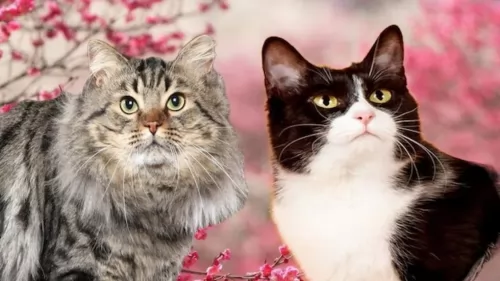 Even though the Skookum has curly hair, it’s not difficult to groom him. You want to brush the soft curls gently once a week. Keep it gentle so that you don’t make the curls frizzy.
Even though the Skookum has curly hair, it’s not difficult to groom him. You want to brush the soft curls gently once a week. Keep it gentle so that you don’t make the curls frizzy.
Use some warm water in a spray bottle with some pet conditioner and spray the curls lightly and use your fingers to liven up the curls.
Cats like to nibble throughout the day and it is better for them to feed like this as opposed to a larger meal morning and night.
However, you will need to know what your cat is eating as you don’t want to overfeed your cat. Obesity comes with a host of health issues. As a carnivore, your cat requires meaty foods so make sure to feed him high-quality cat foods that have meat and protein as the top ingredients.
Your cat must have a constant supply of fresh, cool water.
Provide your cat with a litter box. You will need to clean out the box every day of cat feces as cats don’t like to use a box that is dirty. You get special cat rakes at the vet or the pet shop that makes it easy just to rake up the feces and dispose of them.